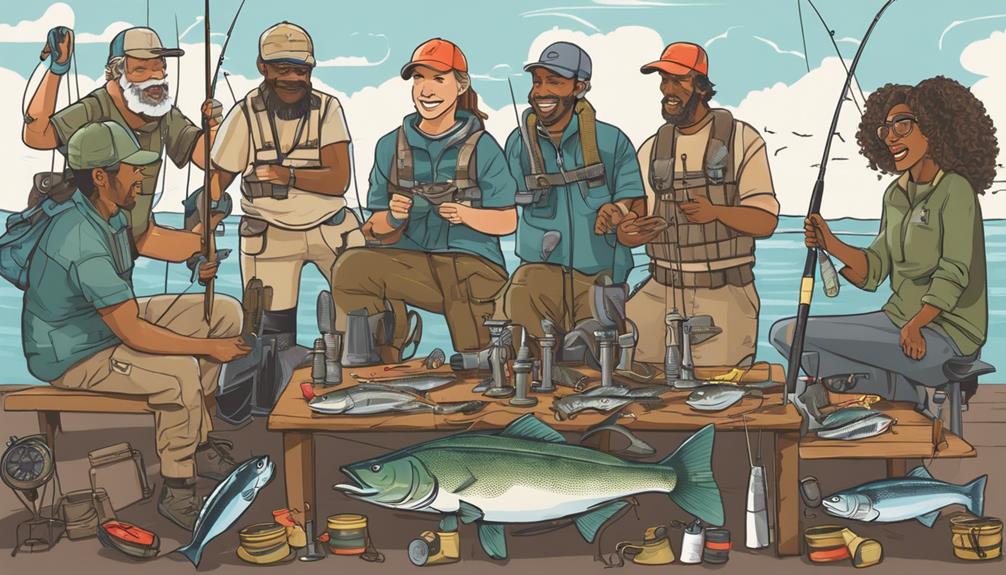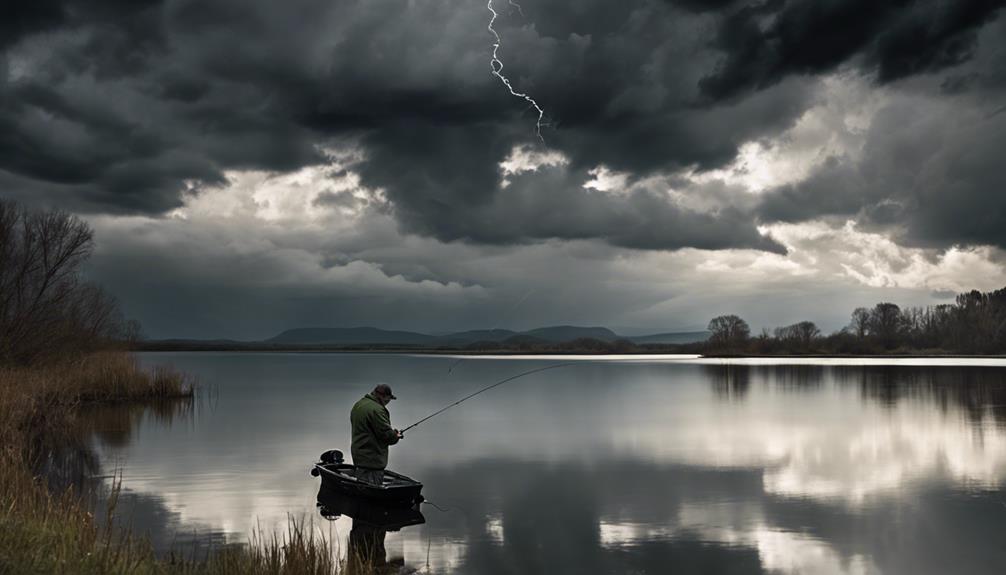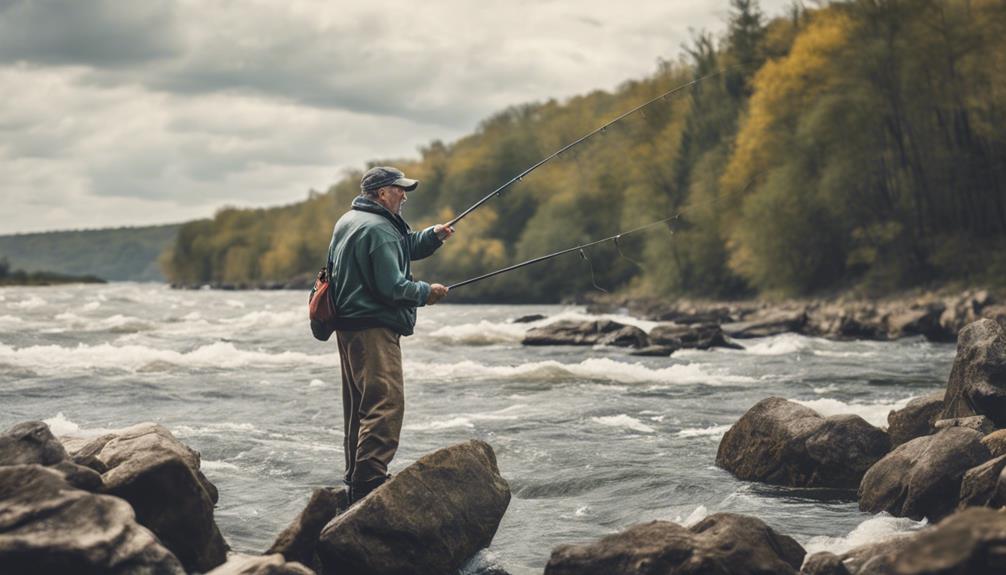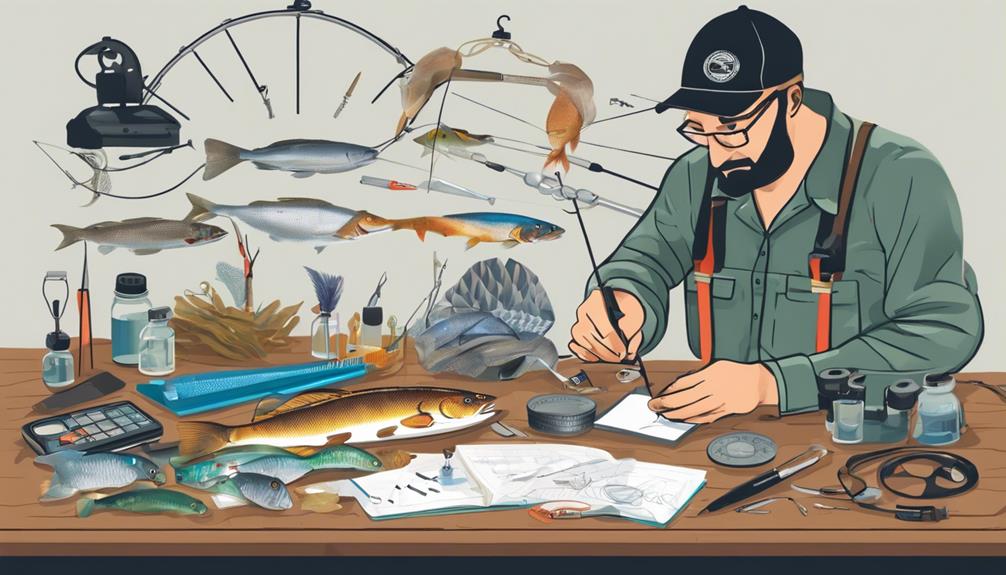Imagine the thrill of reeling in a trophy-winning bass at a major angling competition. To achieve such successes, forming a cohesive and effective competitive angling team is crucial.
But where do you begin? The key lies in not only selecting skilled individuals but also in fostering a strong team dynamic. Understanding the nuances of team roles, communication strategies, and trust-building techniques are just the tip of the iceberg.
Stay tuned to discover the essential tips and strategies that can elevate your angling team to a winning level.
Understanding Team Dynamics
To build a successful angling team, understanding team dynamics is crucial for effective collaboration and performance. Team cohesion is the bedrock on which successful angling teams are built. It involves fostering a sense of unity, trust, and camaraderie among team members. When there's strong team cohesion, individuals work towards a common goal, support each other both on and off the water, and celebrate victories together. As a team leader, it's essential to promote team cohesion through team-building activities, open communication, and fostering a positive team culture.
Conflict resolution is another vital aspect of understanding team dynamics. Conflicts are inevitable in any team setting, but how they're managed can make or break a team. Encouraging open communication, active listening, and a willingness to compromise are key skills in resolving conflicts effectively. As a team leader, your role isn't to avoid conflicts but to address them promptly and constructively. By addressing conflicts head-on and finding mutually beneficial solutions, you can strengthen relationships within the team and prevent unresolved issues from festering.
Identifying Key Roles
Identifying key roles within your angling team is essential for maximizing strengths and optimizing performance. To ensure your team operates at its best, consider the following:
- Role Specialization: Assign specific roles to team members based on their individual strengths and expertise. This allows each angler to focus on what they do best, whether it's mastering a particular fishing technique, handling equipment efficiently, or strategizing during competitions. By specializing roles, you can capitalize on the diverse skill sets within your team.
- Team Cohesion: Encourage collaboration and unity among team members. Strong relationships and effective communication are vital for a successful angling team. Foster an environment where everyone feels valued and heard, promoting a sense of belonging and shared purpose. Team cohesion not only enhances morale but also improves overall performance on the water.
- Leadership Qualities: Identify individuals with natural leadership abilities. Effective leaders can inspire and motivate others, make quick and sound decisions under pressure, and steer the team towards success. Having strong leaders within your angling team can help keep everyone focused, organized, and driven towards common goals.
- Skill Distribution: Distribute skills evenly among team members to ensure a well-rounded and versatile group. While specialization is essential, having a diverse set of skills across the team can enhance adaptability in various fishing scenarios. Ensure that each member brings something unique to the table, whether it's expertise in different fishing techniques, knowledge of specific fishing grounds, or proficiency in equipment maintenance.
Establishing Communication Protocols
Establish effective communication protocols within your angling team to ensure seamless coordination and shared information. Effective communication is the cornerstone of a successful angling team. Establishing clear channels for sharing updates, strategies, and feedback is crucial for maximizing team coordination. Utilize tools such as group chats, shared calendars, and regular team meetings to keep everyone informed and on the same page.
Encourage open communication among team members to foster collaboration and problem-solving. Make sure everyone feels comfortable sharing their thoughts and ideas, and actively listen to each other's viewpoints. This won't only strengthen team coordination but also lead to a more cohesive and effective angling team.
Set guidelines for communication within the team, including preferred methods of communication, response times, and how to handle disagreements or conflicts. By establishing these protocols early on, you can prevent misunderstandings and ensure that communication remains productive and respectful.
Practice active communication during angling outings by providing real-time updates on fishing conditions, catches, and any changes in strategy. Encourage team members to communicate effectively with each other, sharing tips and tricks that can benefit the entire team.
Building Trust and Camaraderie
Start fostering trust and camaraderie among your angling team members through shared experiences and mutual respect. Team bonding and morale boosting are essential for a successful competitive angling team. Here are four key strategies to help you build trust and camaraderie within your team:
- Organize Team-Building Activities: Plan regular team-building activities such as fishing retreats, BBQs, or camping trips. These activities provide opportunities for team members to bond outside of the competitive angling environment, strengthening relationships and fostering camaraderie.
- Encourage Open Communication: Create a culture of open communication within your team where members feel comfortable sharing their thoughts and ideas. This transparency helps build trust and ensures that everyone feels heard and valued.
- Celebrate Team Achievements: Acknowledge and celebrate both individual and team achievements. Recognizing the efforts and successes of team members boosts morale and reinforces a sense of unity and pride within the team.
- Support Each Other: Encourage team members to support and uplift one another, especially during challenging times. Building a supportive environment where team members can rely on each other fosters trust and strengthens the team's bond.
Training and Skill Development
To enhance your competitive angling team's performance, focus on honing skills and training effectively. Start by conducting a thorough skill assessment to identify strengths and areas needing improvement. Utilize this information to tailor specific drills that target those areas. Regularly engaging in these drills will help your team members refine their techniques and become more proficient anglers.
Practice is essential for skill development. Encourage your team to spend dedicated time on the water practicing various techniques such as casting, reeling, and fish handling. By consistently practicing these skills, they'll become more comfortable and efficient in executing them during competitions. Additionally, consider organizing mock tournaments or friendly competitions within your team to simulate real-life angling scenarios and enhance their competitive edge.
Utilize training sessions to not only focus on individual skills but also foster teamwork and communication among team members. Encourage them to share tips and strategies with one another, creating a collaborative learning environment. By working together to improve their skills, your team will strengthen their bond and overall performance.
Strategizing for Tournaments
When preparing for tournaments, focus on developing a strategic game plan that capitalizes on your team's strengths and targets your competitors' weaknesses. To excel in competitive angling, strategizing is key. Here's how you can prepare effectively:
Tournament Strategizing Tips:
- Preparing Mentally:
Mental preparation is crucial for success in tournaments. Encourage your team to stay focused, positive, and confident. Visualize different scenarios and outcomes to be ready for anything the tournament throws at you.
- Equipment Selection:
Choose your equipment wisely based on the specific requirements of the tournament venue and target fish species. Ensure your gear is in top condition and suitable for the challenges you might face during the competition.
- Scouting and Research:
Before the tournament, research the competition waters, study the behavior of the fish in the area, and gather information on past tournaments. This knowledge will help you form a more effective game plan.
- Team Strategy Session:
Gather your team for a strategy session where you discuss each member's role, strengths, and weaknesses. Develop a coordinated approach that leverages everyone's skills to maximize your chances of success on tournament day.
Managing Team Finances

After strategizing effectively for tournaments, it's essential to focus on managing your team's finances efficiently to ensure long-term sustainability and success. Budgeting expenses is a critical aspect of financial management for any competitive angling team. Start by creating a detailed budget that outlines all potential costs, including entry fees, travel expenses, accommodations, equipment, and any other necessary expenditures. By having a clear understanding of your financial commitments, you can make informed decisions that will help you stay within budget constraints.
Financial transparency is another key component of managing your team's finances effectively. It's important to establish clear communication channels regarding the team's financial status. This includes keeping detailed records of income and expenses, sharing financial updates regularly with team members, and being transparent about any financial challenges or constraints the team may face. By fostering a culture of openness and honesty when it comes to finances, you can prevent misunderstandings and ensure that everyone is on the same page.
In addition to budgeting expenses and maintaining financial transparency, it's crucial to regularly review and adjust your financial strategies as needed. Monitor your team's financial performance closely, identify any areas where costs can be minimized, and explore opportunities to increase revenue through sponsorships or fundraising efforts. By staying proactive and diligent in managing your team's finances, you can pave the way for long-term success on the competitive angling circuit.
Evaluating Team Performance
Evaluating your competitive angling team's performance requires a systematic analysis of key metrics and indicators. To ensure your team is on the path to success, consider the following steps:
- Performance Analysis: Regularly assess individual and team performance in competitions. Identify strengths and weaknesses to understand where improvements are needed. Utilize performance analysis tools to track progress over time.
- Team Feedback: Encourage open communication within your team. Gather feedback from team members regarding their experiences, challenges faced, and suggestions for improvement. Constructive feedback is invaluable for fostering growth and cohesion within the team.
- Metrics Tracking: Implement a system for tracking key performance metrics such as catch rate, accuracy, and teamwork effectiveness. Analyzing these metrics can provide valuable insights into areas that require attention and areas of success.
- Improvement Plans: Based on the performance analysis and feedback received, develop tailored improvement plans for individual team members and the team as a whole. Set specific goals and timelines to track progress and adjust strategies as needed.
Frequently Asked Questions
How Can a Competitive Angling Team Effectively Handle Conflicts or Disagreements Among Team Members?
When conflicts arise within a competitive angling team, effective conflict resolution is key to maintaining positive team dynamics. Address disagreements openly and encourage communication among team members.
Listen actively to all perspectives and work together to find a solution that benefits the team as a whole. By handling conflicts in a constructive manner, you can strengthen team relationships and improve overall performance on the water.
What Strategies Can Be Used to Maximize Team Morale and Motivation During Tough Competitions?
To boost team morale during intense competitions, try incorporating team building activities and motivational techniques.
Effective communication strategies and positive reinforcement can also keep spirits high.
Encourage open dialogue and provide constructive feedback to keep everyone motivated and focused.
Are There Any Specific Methods for Incorporating New Team Members Into an Established Competitive Angling Team?
When adding new members to an established competitive angling team, focus on team integration and dynamics. Start by introducing them to the team and explaining their roles.
Encourage open communication to build trust and teamwork. Provide opportunities for new member orientation to help with a smooth transition.
Emphasize team cohesion by organizing bonding activities and setting clear goals together. By incorporating these strategies, you can strengthen your team and improve performance.
How Should a Team Handle Setbacks or Losses in Tournaments to Maintain Team Unity and Motivation?
When facing setbacks or losses in tournaments, remember that maintaining team unity is crucial. Team bonding and resilience are key to overcoming challenges.
Stay united and support each other through tough times. Persevere together and learn from mistakes to grow stronger as a team.
Celebrate small victories and keep pushing forward with determination. Your unity and motivation will help you bounce back stronger and achieve success in the future.
What Are Some Ways to Ensure the Long-Term Sustainability and Growth of a Competitive Angling Team?
To ensure the long-term sustainability and growth of your competitive angling team, focus on seizing sponsorship opportunities and organizing effective fundraising initiatives.
Engage in strategic marketing tactics and foster community involvement to increase visibility and support.
By broadening your network, you'll establish a solid foundation for your team's future success and expansion.
Embrace these avenues to secure resources and build a strong presence within the angling community.
Conclusion
In conclusion, forming a winning competitive angling team requires several key components:
- Understanding team dynamics
- Identifying key roles
- Establishing communication protocols
- Building trust and camaraderie
- Training and developing skills
- Strategizing for tournaments
- Managing finances
- Evaluating team performance
By following these tips and strategies, your team can work together effectively to achieve success in angling competitions.
Remember, teamwork makes the dream work!



